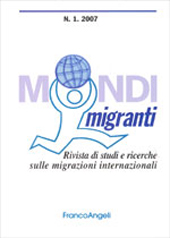Le cas de la migration féminine ivoirienne : vers une nouvelle forme de migration autonome
161-183 p.
Résumé: Cette contribution se base sur une recherche qualitative menée principalement en France, notamment sur le territoire parisien, afin d'explorer le phénomène de la migration féminine ivoirienne à travers une perspective de genre. La recherche vise à examiner l'intersection entre la vulnérabilité, l'exploitation, les discriminations de genre d'une part, et les processus potentiels d'émancipation, d'autonomie et d'affirmation d'autre part, rendant ainsi la complexité et la polyvalence qui caractérisent ce phénomène migratoire spécifique. L'élément central de cette étude réside dans le concept d'autonomie lié à la migration féminine ivoirienne, que nous avons mis en évidence en expliquant ses origines, ses dynamiques et sa réalisation
Après une analyse approfondie du contexte socio-économique et culturel ivoirien, cet article retrace le parcours migratoire des femmes ivoiriennes, en se focalisant sur les conditions de vie et d'accueil dans les pays désignés comme "de transit" (Maroc, Tunisie, Italie), et en analysant ensuite le contexte français. L'étude met l'accent sur les stratégies de survie et de régularisation mises en œuvre par les femmes ivoiriennes, non seulement pour faire face aux multiples discriminations et aux violences qu'elles subissent, mais également pour façonner leur propre parcours d'affirmation et d'autonomie, souvent entravé par des politiques européennes en matière d'immigration et d'asile extrêmement problématiques. Mots-clés: migration féminine ; Côte d'Ivoire ; genre ; vulnérabilité ; violence basée sur le genre (VBG) ; autonomie ; régularisation. [Résumé par l'éditeur]
This contribution is based on a qualitative research study conducted primarily in France, specifically in the city of Paris, to investigate the phenomenon of Ivorian female migration from a gender perspective. The research aims to explore the intersection between vulnerability, exploitation, gender discrimination on one hand, and potential processes of emancipation, autonomy, and affirmation on the other, thereby capturing the complexity and polyvalence that characterize this specific migratory phenomenon. The central element of this study revolves around the concept of autonomy associated with Ivorian female migration, highlighted by elucidating its origins, dynamics, and realization. Following a careful analysis of the Ivorian socio-economic and cultural context in Côte d'Ivoire, this article reconstructs the migratory path of Ivorian women, focusing on living conditions and reception in countries defined as "transit"(Morocco, Tunisia, Italy), and subsequently analyzing the French context
The study places particular emphasis on survival and regularization strategies implemented by Ivorian women, not only to face multiple situations of discrimination and violence but also to shape their own path of affirmation and autonomy, often hindered by European immigration and asylum policies that pose significant challenges. [Publisher's text]
Is part of
Mondi migranti : 3, 2024-
Articles from the same issue (available individually)
-
Information
DOI: 10.3280/MM2024-009
ISSN: 1972-4896
DISCIPLINES
KEYWORDS
- migrazioni femminili Costa d'Avorio genere vulnerabilità violenza di genere autonomia regolarizzazione
- female migration Ivory Coast gender vulnerability gender-based violence autonomy regularization


